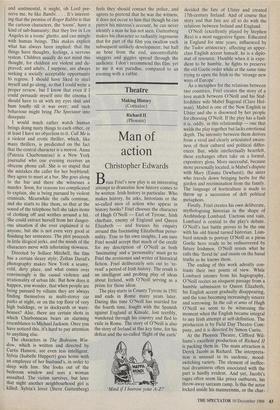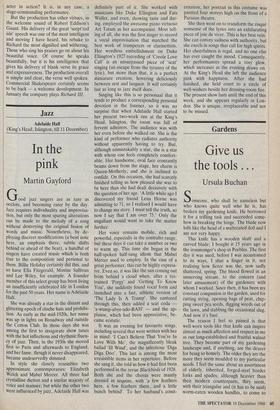Theatre
Making History (Cottesloe)
Richard II (Phoenix)
Man of action
Christopher Edwards
Brian Friel's new play is an interesting attempt to dramatise how history comes to be written. Irish history in particular. Who makes history, he asks, historians or the so-called men of action who appear in history books? Friel chooses the character of Hugh O'Neill — Earl of Tyrone, Irish chieftain, enemy of England and Queen Elizabeth — and focuses his enquiry around this fascinating Elizabethan perso- nality. True to his own insights, I am sure Friel would accept that much of the credit for my description of O'Neill as both 'fascinating' and a 'personality' must go to Friel the revisionist and writer of historical fiction. Friel deliberately sets out to 're- read' a period of Irish history. The result is an intelligent and probing play of ideas about Ireland, with O'Neill serving as a prism for those ideas.
The play starts in County Tyrone in 1591 and ends in Rome many years later. During this time O'Neill has married for the fourth time, fought with the Spanish against England at Kinsale, lost terribly, wandered through his country and fled to exile in Rome. The story of O'Neill is also the story of Ireland at this key time, for his defeat and the so-called 'flight of the earls' 'Mind if 1 borrow your A-Z?' decided the fate of Ulster and created 17th-century Ireland. And of course that story and that fate are all to do with the relations between Ireland and England.
O'Neill (excellently played by Stephen Rea) is a most suggestive figure. Educated in England for nine years, influenced by the Tudor aristocracy, affecting an upper- class English accent himself, he is a diplo- mat of resource. Humble when it is expe- dient to be humble, he fights to preserve the old Gaelic order while at the same time trying to open the Irish to the 'strange new ways of Europe'.
As a metaphor for the relations between two countries, Friel creates the story of a love match between O'Neill and his Staf- fordshire wife Mabel Bagenal (Clare Hol- man). Mabel is one of the New English in Ulster and she is disowned by her people for choosing O'Neill. If the play has a fault it is, oddly, in this relationship — one that welds the play together but lacks emotional depth. The intensity between them derives from a vivid and clearly articulated aware- ness of their cultural and political differ- ences. But, while intellectually heartfelt, these exchanges often take on a formal, expository gloss. More successful, because more personally located, is Mabel's dispute with Mary (Emma Dewhurst), the sister who travels down bringing herbs for the garden and recrimination from the family. The language of horticulture is made to throw up a succession of deft political metaphors.
Finally, Friel creates his own deliberate, mythologising historian in the shape of Archbishop Lombard. Unctous and vain, Lombard is central to the play's debate. O'Neill's last battle proves to be the one with his old friend turned historian. Lom- bard intends to portray O'Neill as a pious Gaelic hero ready to be rediscovered by future Irishmen. O'Neill resists what he calls this 'florid lie' and insists on the banal truths as he knows them.
The ending of this work adroitly con- trasts their two points of view. While Lombard intones from his hagiography, O'Neill recites an eloquent passage from a humble submission to Queen Elizabeth, his English accent gradually disappearing, and the tone becoming increasingly sincere and sorrowing. In the odi et amo of Hugh O'Neill we seem to be witnessing the moment when the English became integral to any Irish attempt at self-definition. The production is by Field Day Theatre Com- pany, and it is directed by Simon Curtis.'
At the Phoenix Theatre, Clifford Wil- liams's excellent production of Richard 11 is packing them in. The main attraction is Derek Jacobi as Richard. The interpreta- tion is unusual in its sardonic, mood- switching variety. The element of ineffec- tual dreaminess often associated with the part is hardly evident. And yet, Jacobi's rages often seem like prissy outbursts, his throw-away sarcasm camp. Is this the actor locked inside his mannerisms, or the char-
acter in action? It is, in any case, a stage-commanding performance.
But the production has other virtues, in the welcome sound of Robert Eddison's Gaunt. His delivery of the great `scept'red isle' speech was one of the most intelligent and moving I have heard, his rebuke to Richard the most dignified and withering. Those who sing his praises go on about his beautiful voice. Of course he speaks beautifully, but it is his intelligence that gives his delivery of blank verse its grace and expressiveness. The production overall is simple and clear, the verse well spoken. Commercial Shakespeare certainly seems to be back — a welcome development. In January the company plays Richard III.



























































 Previous page
Previous page